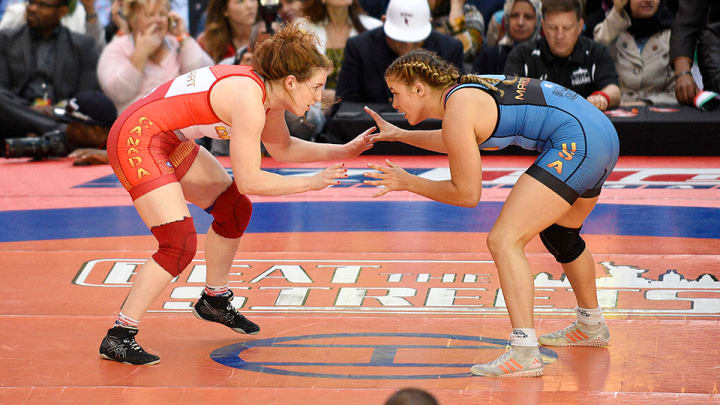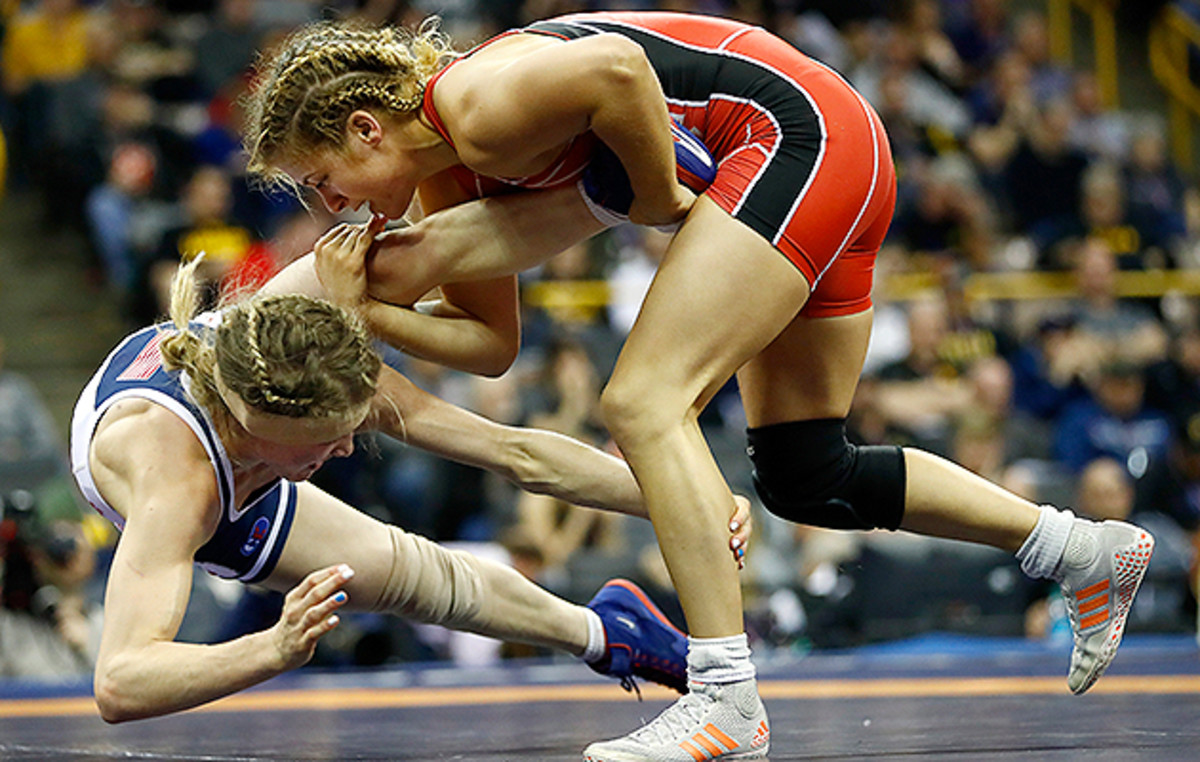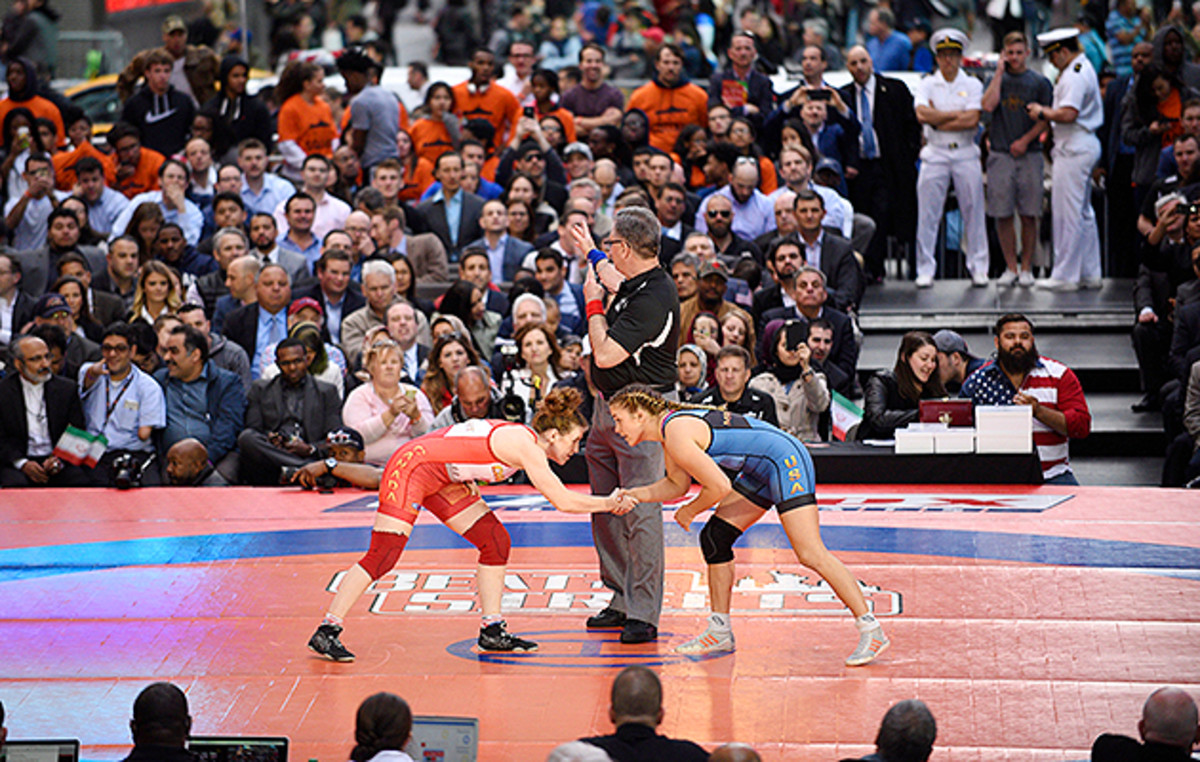Wrestler Helen Maroulis’s toughest opponent remains off the mat

Your teams. Your favorite writers. Wherever you want them. Personalize SI with our new App. Install on iOS or Android.
U.S. wrestler Helen Maroulis, the defending world champion, hasn’t lost an international match in more than a year, and she’s a gold-medal favorite at the 2016 Olympics. But due to a recent rule change by wrestling’s governing body, the International Amateur Wrestling Federation (FILA), now known as United World Wrestling, the toughest part of Maroulis’s Olympic journey this year will be the scale.
Women’s freestyle wrestling made its debut at the 2004 Games in Athens with four weight classes: 48 kg (105 lbs.), 55 kg (121 lbs.), 63 kg (138 lbs.) and 72 kg (158 lbs.). Due to a rise in popularity of the sport, FILA adjusted the weight classes, adding the 53- and 58-kg classes and eliminating 55 kg—Maroulis’s weight class.
When Maroulis first heard the news that her weight class was being dropped, she had mixed emotions. As one of the sport’s advocates for growth, she was excited, because it meant more opportunities for female wrestlers around the world. But on the other hand, she had built up quite the trophy case wrestling in the 55-kg weight class, highlighted by a gold medal at last year’s world championship, a silver in 2012 and a bronze in ’14.
• IAAF ban of Russia’s track and field team a small win for drug-soaked sport
Maroulis was faced with a decision: she could either lose five pounds and go down a weight class or grow into the heavier, stronger weight class. She ultimately decided her chances at an Olympic gold medal would be better at 53 kg.
“I know I work hard, but could I give this extra bit, could I go deeper and find this extra thing to give, and that’s where the nutrition and weight cutting come in,” Maroulis says before USA wrestling’s Beat the Streets match in Times Square on May 19. “I would love to just go, practice and focus on wrestling. But I felt like I had been preparing for my opponents at 53 [kg] for a while and I wanted to do what was best for my body and obviously my wrestling.”
To those who have never “cut” weight, a few pounds may not seem like that big of a deal. But for an already-incredibly-fit wrestler, taking off a few pounds can take quite a bit of extra work.
“I knew I was going to be challenged in ways I hadn’t ever been challenged before,” Maroulis says. “When you go to practice, that may be two hours a day, four hours a day, or maybe six hours a day. But nutrition is something you have to deal with 24 hours a day, seven days a week. And yeah, maybe you can always make weight but you have to do it the right way, or else you don’t have your strength.”
The elimination of her weight class put Maroulis in unfamiliar territory—not that she’s uncomfortable with that either.

When she was seven years old, Maroulis began wrestling with the boys. After placing sixth in the Maryland state tournament in high school, becoming the first girl to place in states, she finally began to compete against—and beat—other women in college. In 2010 she wrestled at Missouri Baptist, winning the Women’s College Wrestling Association title. She then transferred to Simon Fraser University, where she won the 2011, ’13 and ’14 WCWA women’s college national championship.
Maroulis took 2012 off to focus on qualifying for the London Games, and heading into the Olympic Trials, she was the favorite. But she lost by a point to Kelsey Campbell in the finals of the trials. At the time, she was devastated, but she said she now has a lot more knowledge and maturity that she didn’t four years ago—something she believes makes her even more dangerous on the mat this year.
That knowledge and maturity was evident in January when Maroulis won a wrestle-off that earned her a spot to the Pan American Olympic Games Qualifying Tournament. But she said at the time, she didn’t feel comfortable wrestling in the 53-kg class yet, so she decided to drop out of the tournament and instead start focusing for the Olympic Trials in April. Because she skipped that event, the U.S. didn’t qualify for an Olympic spot. After Maroulis claimed victory at the Olympic Trials, she had to go compete in a qualifying event in Mongolia, where she easily won the tournament to secure her spot in Rio.
• Ryan Lochte: My rivalry with Michael Phelps is one of the best in sports
Clearly, she’s making the adjustments to her new weight class. But along the way, Maroulis had some help. In order to make sure she cut weight the right way, she reached out to two experts, Erik Arevalo and Charles Poliquin.
Arevalo, a personal trainer and MMA fighter, helped with her nutritional needs. Poliquin is a strength coach who has trained athletes across various sports including 18 Olympic medalists such as gold medalist long jumper Dwight Phillips and two-time shot put silver medalist Adam Nelson. When Maroulis first met with Arevalo at a wrestling event, she explained how she didn’t know which type of diet to go on because she was receiving contradicting information. Arevalo, a former All-American wrestler at Mt. San Antonio Junior College, put her on a plan that had her on a high calorie intake on days she was training harder, and a low calorie intake on easier days.
“People go on these rapid weight cuts, and sacrifice everything from strength to health,” Arevalo said. “We refer to our process as ‘the ladder method,’ where we gradually adjust calories based on workouts. From there we can monitor the weight loss and pull pounds off gradually to preserve the strength and the health as competition approaches and can adjust calories up and down the rungs of the ladder based on the demands of training.”
• Coach of top Ethiopian runner arrested for possession of EPO
At first, Maroulis said she wasn’t performing at the highest level in her new weight class, but she’s felt stronger there every day. In order to maintain her strength, Poliquin is trying to get her to put a pound of muscle on for every pound of fat she loses. So far, it’s working as well as he could have hoped. At first, Maroulis couldn’t do a single chin-up; she can now complete several with a 60-pound weight tied around her waist.
“When you watch her wrestle, she’s just out-muscling girls left and right,” Poliquin said. “She’s told me how she feels like she’s a weight class above her competitors, which obviously isn’t true, but that’s how much stronger she feels.”
Arevalo said he plans on traveling to Brazil to help Maroulis with her diet plan down there, specifically at the cafeteria in the Olympic Village where there will be a wide variety of options for the athletes. Arevalo said the key with dealing with all of the different food options will be portion control and making sure she’s getting the right nutrients.
Also different in Rio, Maroulis’s weight class will weight in the day before her event takes place on Aug. 18, giving her a full day to recover and regain energy. In other international competitions, wrestlers weigh in and compete on the same day.
“She’s got enough stress just competing in the Olympics, so it’s not her job to maintain it, that’s my job,” Arevalo said. “Her job is to wrestle, her strength coaches job is to make sure she’s strong, etc. She has a really good team around her, and our job is to make sure she’s performing at the highest level.”

Maroulis said she’s now as comfortable wrestling at 53 kg as she did at 55 kg, and her strength is showing on the mat. At the Beat the Streets match in Times Square, Maroulis manhandled her opponent, 2016 Pan American gold medalist Samantha Stewart of Canada, winning with a pin in 2:41.
Team USA has won one silver medal and three bronze medals in women’s wrestling events, so can Maroulis become the first U.S. woman to win wrestling gold? Certainly don’t count her out.
“So many people make comments about my weight that I sometimes have to step back and be like, ‘It’s really not that big of a deal,’” Maroulis said. “Yeah, it takes more planning, effort, sacrifice, everything, and emotionally it can be an adventure, but it always seems to work itself out.”
